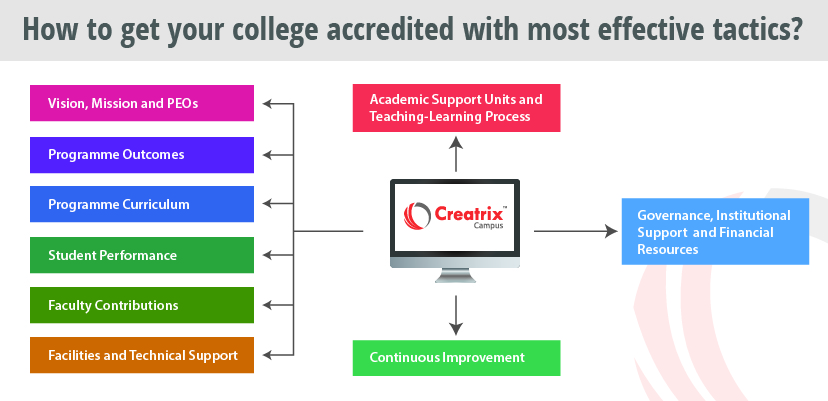Academic accreditation is a formal recognition of an educational program or Institution in accordance with the standards of quality set by the accreditation agency against well-defined criteria. Collegiate accreditation is granted to particular higher educational Institutions on the basis of an impartial assessment of the attainment of specific requirements in terms of its performance, related to the academic processes and outcomes, covering the entire academics, administration, and services.
Why does accreditation with technology matter?
In the past several years, there has been a great deal of discussion about the accreditation and assessment of programs in higher education institutions. Educators, students, parents, and others have posed questions about the value of accreditation in higher education, focusing particularly on the value added at the institutional level. It is important to consider the contributions of technology-enabled accreditation makes to the institution, students, and society as well.
- Provides institutions with a new sense of direction and identity for institutions
- Easily identify & fill up the gaps in the curriculum to improve learning standards
- Curriculum planning & revision based on online surveys
- Measurement of course & learning outcomes at every level with auto-mapping
- Innovation in teaching methods & assessments with online tests, quizzes & puzzles using faculty information system
- Continuous improvement in education processes at every stage to deliver quality education
- Students and parents can be confident about the curriculum, teaching, infrastructure, and the learning resources
- Graduates of accredited programs are fully prepared to enter the workforce
Continuous Improvement
To ensure that a technology-based accreditation management system adopted is credible and acceptable, educators must have a strong hand in its development. Before the departments and offices adopt the automated accreditation system, educators should fulfill the quality standards set by the accreditation agency for continuous improvement. Colleges and universities can then use these standards to guide the implementation of curriculum, assessment, evaluation and learning resources. In general, an automated accreditation system is customizable and flexible enough to accommodate diversity in instructional methods used in the department, college or university.
Accreditation Outcomes
- Technology-enabled accreditation is easy-to-use and customize and requires minimal training
- Outcome Based Education Software and Accreditation Management System has been prepared to meet the needs of faculty, management and students of higher education institutions
- Educational institutions can easily analyse their strengths, weaknesses, and opportunities through an informed review process
- Planning and resource allocation becomes easy
- Improve intra and inter-institutional communication through real-time email notifications & SMS alerts
- Eliminate traditional spreadsheets, word documents, and legacy systems
- Quick and easy to import data from existing systems
- Role-based secure access to data & reports
- Intelligent reporting and dashboards for insightful decisions
- Manage standards, track history, and provide up-to-date version to the constituents
- Generate reports based on accreditation status and workflow progress and export data to various formats such as Word, Excel, and PDF.
Want to contribute?
We welcome thought leaders to share ideas and write for our blog.
Become a Guest Author →

